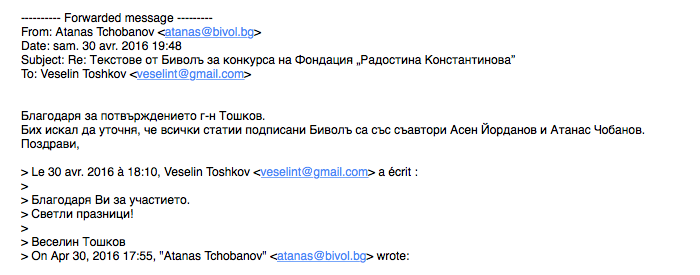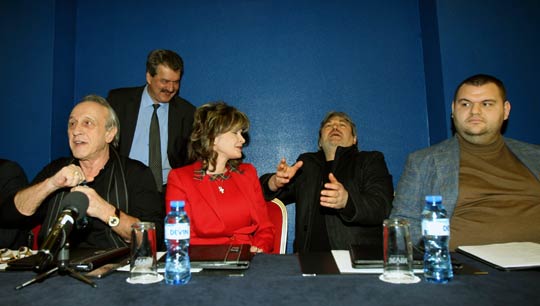Last week Bivol became once again the victim of an attack by Bulgaria’s backstage rule. This time we are not being sued in Court, attacked physically or by slander in Bulgarian mainstream media’s front pages. This time the strike came from a Foundation declaring itself the pillar of the free, independent and courageous investigative journalism. It is established in memory of our dear deceased colleague Radostina Konstantinova and it is named after her.
Each year the “Radostina Konstantinova” Foundation collects nominations for investigative journalism with serious public contribution and benefit to society. A respected jury of colleagues from different media determines the Grand Prize for investigative reporting and other incentive awards. This year the jury has decided to award the Grand Prize for investigative journalism to Bivol. We participated with investigations in the hidden ownership of one of the largest and most structurally important enterprises in Bulgaria – the tobacco manufacturer “Bulgartabac” and in the newly built “palace” on the Black Sea Coast known as the “waterfront seraglio of Dogan”, named after Ahmed Dogan, who is the Honorary Lifetime Chairman of the partly largely representing the Muslim minority in Bulgaria, Movement for Rights and Freedoms (DPS), and the politician seen as the mastermind of the country’s backstage rule. As we believe that such rule is destroying Bulgaria slowly and painfully, both topics are a priority for Bivol and we backed our investigations with specific documents, evidence, and facts.
In addition to Dogan, the investigations lead to other prominent figures in Bulgaria, such as current second-term Prime Minister, Boyko Borisov, controversial DPS lawmaker and mogul, Delyan Peevski, as well as the collapsed Corporate Commercial Bank (CCB), once the “darling” of all governments, whose failure robbed over 6 billion levs from Bulgarian taxpayers.
After examining the investigations, the jury decided by a majority vote to award the Grand Prize to Bivol, namely to Assen Yordanov – journalist and Director of the site and its Editor-in-Chief – Atanas Tchobanov.
However, upon learning of this decision, the Managing Board of the Foundation urgently summoned a meeting with only one item on its agenda – how to prevent bestowing the award to Bivol. To justify the unprecedented withdrawal of this legitimately awarded prize, the Board issued a statement that Bivol is an anonymous site and it was unclear who are the people standing behind the publications, causing a serious public outcry and media discussions.
The site is in no way anonymous. The application sent to the jury explicitly listed Assen Yordanov and Atanas Tchobanov as authors of the investigations. The mail, in which we address this issue, was received by the Chairman of the Committee on Nominations – Vesselin Toshkov, and he confirmed receipt of it via email, thanking us for our participation. Moreover, since the very creation of the site, we, Yordanov and Tchobanov, are publicly standing with our names as its investigative team.
According to media reports, the Management Board of the Foundation includes journalist and media owner, Petyo Blaskov, his wife Milena Popova, two other journalists, two lawyers and Maria Vangelova, the mother of the late Radostina Konstantinova. There are no public documents about the management of the Foundation in the Trade Register and the NGO Register of the Ministry of Justice.
According to information from the site Mediapool, Ms Vangelova and the two lawyers were against the decision not to award the grand prize to Bivol, but the group around Mr Blaskov prevailed by one vote.
We must remind that Trud (Labor) daily, which is owned by Petyo Blaskov, was one of those media that viciously attacked Bivol’s journalists. The financing of this newspaper by Peevski, who is involved in the shady privatization of Bulgartabac and is directly affected by our investigations, is publicly known. Blaskov acquired Trud with a loan from First Investment Bank (FIB). The majority shareholders of the bank, Ivaylo Mutafchiev and Tseko Minev, are subject of other Bivol investigations into the draining of the private lender and their participation in an organized criminal group for theft of EU funds. This is also the bank where companies associated with Delyan Peevski transferred their loans shortly before the collapse of CCB. However, the “moral” closeness between Peevski and Blaskov dates from years earlier, when they founded the alternative media association in Bulgaria (pictured).
Following the decision of the Board to revoke Bivol’s prize, seven of the nine members of the jury sent a statement to the media. It says that the members of the jury as journalists stand firm behind the position that the author must have the courage to sign what they claim and that Bivol’s tradition to sign their stories as a team deviates from this standard and this is to the site’s detriment. They, however, explicitly stress that in no way the jury had been misled about the authorship of the nominated for the Grand Prize investigations of bivol.bg as it has been aware of the lack of listed authors.
The jury explains that the stories, sent by bivol.bg for the contest, were accompanied by a written assurance from the site that the two investigations are presented in co-authorship by Assen Yordanov and Atanas Tchobanov, meaning that both authors are standing with their names behind the texts. Furthermore, the problem of authorship has been discussed in detail and the opinion that the merits of the investigations outweigh the lack of signatures prevailed among the majority of the jury members. The investigations were identified as the most significant and with the greatest public impact among the nominees.
The Association of European Journalists condemned the decision of the Managing Board, writing in a statement that the refusal to award a prize for investigative journalism to the site Bivol.bg is an extremely disturbing indication.
Strong reactions, opposing the decision, were published in a number of online media such as The Voice of Young People in Bulgaria, Dnevnik (Diary), Sega (Now), Club Z, Topnovini (Top News), Mediapool, and Actualno (Actualities), among others.
One member of the jury, well-known Bulgarian journalist, Petya Vladimirova, told the state radio, Bulgarian National Radio (BNR), that the decision is an outrage, the investigations are of extreme importance for the country, and the jury had no doubts whatsoever who their authors are.
Factual chronology
On April 30, 2016, Bivol’s Editor-in-Chief, Atanas Chobanov, sent to the jury two proposals for nomination:
“Dear colleagues,
We are pleased to apply for the competition for investigative journalism of Foundation “Radostina Konstantinova” with two investigations carried out last year.
Please confirm receipt of the texts and we wish you wonderful Easter holidays.
Respectfully,”
- Bulgartabac – the smuggling piggybank of Bulgaria’s backstage rule
This complex investigation of Bivol, based on documents from Bulgaria, USA, Liechtenstein and Dubai, exposes a scheme for large-scale smuggling of cigarettes, manufactured by Bulgartabac, to the Middle East that is used to finance terrorist organizations. The peak of this illegal trade coincided with the height of Delyan Peevski’s career in 2013-2015 and him becoming the symbol of the parallel, backstage rule in the State – the so-called model “WHO”. The exposing of this scheme led to the termination of the contraband and Peevski’s withdrawal from Bulgarian politics and business (at least this is what he declared), and this is a result of great public interest.
Another indisputable result of this investigation is the disclosure of the fact that the state was cheated in the privatization of Bulgartabac. Officially, the deal was with the Russian bank VTB, but in fact the Bank has previously negotiated the payments to come from offshore companies registered in Liechtenstein, whose money is of unknown origin and there are suspicions that laundered money from smuggling has been used in this operation. This evidence gives cause for review and cancellation of the privatization deal after the sudden collapse of production and layoffs in Bulgartabac.
The investigation in the backstage ownership of Bulgartabac continues and is a primary task for the team of Bivol due to evidence that besides Peevski, a known Iraqi smuggler has become a co-owner in Bulgartabac, along with Dogan and Borisov, who received a commission as their reward for the political blessing for the privatization of Bulgartabac in 2011.
Publications on the subject started in July 2015, the last post was on April 20, 2016
Most significant publications:
Bulgartabac Mafia II: The “black money” trail -from Vienna to the Persian Gulf
Middle East Distributors of Bulgarian Tobacco Maker Are Outlawed
Peevski Is Leaving, Bulgartabac Is Leaving… Partnership with Bulgaria’s Powerful People Remains
- Dogan Seraglio – the new summer residence of Ahmed Dogan in Rosenets
The story of the seraglio was investigated in detail in several texts of Bivol. The first is from September 2014 and the last post was on April 14, 2016. The investigation revealed the full sync among institutions to please, by breaching the law, the whim of Ahmed Dogan to have a new private residence in an emblematic location – Cape Chukalyata in the Bourgas Bay. The building is designed by infamous architect, Kalin Tiholov, and is funded with a loan from CCB in the amount of 18 million levs, which is non-performing and listed as “bad credit” by the bank’s liquidators. De facto, this is money laundering. Local authorities in Burgas assisted with the approval of a detailed territorial plan for “Water Sports Facilities” and pushed it under a procedure for socially important facilities, although the water sports will be obviously practiced only by the occupants of the palace. Then, the City Hall issued in no time building permits and even gave up ownership of the street that leads to the seraglio to cut access to it by land. The Regional Inspectorate of Environment and Waters (RIEWs) issued an opinion that the massive construction does not need an environment impact assessment on the backdrop of the fact that the huge new palace falls within the protected area “Bakarlaka” under the European directive on the conservation of birds and it is expressly forbidden to build there. After the seraglio was erected, exceeding by more than 6 meters the allowed height, the National Construction Control saw nothing wrong and declared that the hovering tower is an “artistic architectural element”.
Publications on the topic Dogan Seraglio:
Infamous Bulgarian Architect Is Building the Scandalous Seraglio in Rosenets
Bulgarian Construction Control Sees Nothing Wrong with the Seraglio in Rosenets
Seraglio near LUKOIL Port – Display of Bulgaria’s Tacit Coalition

The Technical Secretary of the Foundation Vesselin Toshkov’s email confirming receipt of the information on the investigations’ authorship
***
If you find this article useful, support our work with a small donation.
Pay a Bivol Tax!
We will highly appreciate if you decide to support us with monthly donations keeping the option Monthly
The form is not published.
IBAN: BG27 ESPY 4004 0065 0626 02
BIC: ESPYBGS1
Титуляр/Account Holder: Bivol EOOD
При проблеми пишете на support [at] bivol [dot] bg
This post is also available in: Bulgarian









You must be logged in to post a comment.